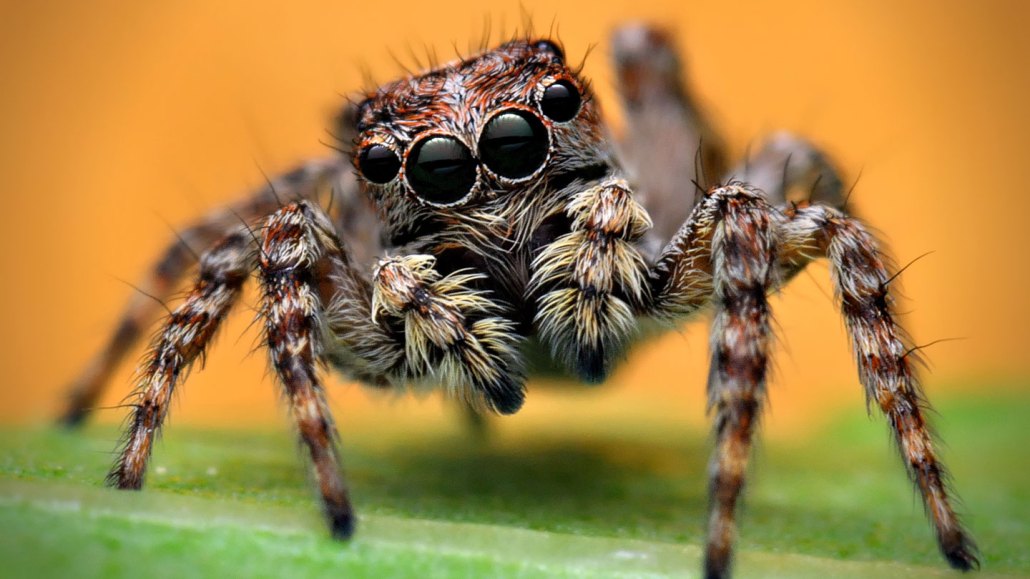News stories about spiders are unfairly negative
Frequent errors in news reports likely contribute to the animals’ undeserved bad reputation

Online news stories about people’s encounters with spiders, such as this harmless jumping spider, often contain errors or overhyped language, a new study finds.
xbn83/Moment/Getty Images Plus
Share this:
- Share via email (Opens in new window) Email
- Click to share on Facebook (Opens in new window) Facebook
- Click to share on X (Opens in new window) X
- Click to share on Pinterest (Opens in new window) Pinterest
- Click to share on Reddit (Opens in new window) Reddit
- Share to Google Classroom (Opens in new window) Google Classroom
- Click to print (Opens in new window) Print
By Betsy Mason
Spiders are pretty remarkable. They live almost everywhere, from rainforests to deserts. Some even spend most of their lives underwater. They are smarter than you think, with some able to make plans and count. Scientists think they might even dream when they sleep. Yet many people find these eight-legged animals creepy or scary. Now, it seems, fake news may be partly to blame.
Media reports about people’s encounters with spiders tend to be full of falsehoods, a new study finds. Researchers analyzed a decade’s worth of newspaper stories. These articles were published in dozens of countries. Nearly half contained errors. And those untruths about spiders had a distinctly negative spin.
Researchers shared the findings August 22 in Current Biology.
“The vast majority of the spider content out there is about them being scary and hurting people,” says Catherine Scott. In reality, they note, “spiders almost never bite people.” An arachnologist, Scott studies spiders at McGill University in Montreal, Canada.
Of some 50,000 species of spiders known to science, only a few are dangerous. In fact, many spiders protect us by eating insects, such as mosquitoes, that spread disease. Even spiders that could pose a threat — such as the brown recluse and the black widow — rarely bite people, Scott says.
But error-filled news reports paint spiders in a different light. Some stories about spider bites blamed species that don’t even live where the bite happened. Others reported that people bitten by spiders showed symptoms that don’t match those of actual bites. In fact, Scott found, “Many stories about spider bites included no evidence whatsoever that there was any spider involved.”
Spiders often portrayed as ‘bad’ news
For the new study, Scott and their colleagues analyzed more than 5,000 online newspaper stories about humans and spiders. Each had been published between 2010 and 2020. They came from 81 countries and were written in 40 languages.
The researchers didn’t just find errors in the stories. More than four in every 10 articles had sensationalized the spiders’ behaviors. Such overblown stories often used words like nasty, killer, agony and nightmare to describe the arachnids. International and national newspapers were more likely to use sensational terms than were regional outlets. Stories that included a spider expert were less sensational. That was not true for stories that quoted other types of experts, such as doctors.
If people knew the truth about spiders, they would spend less time blaming them for bites caused by other animals, Scott argues. People might also be less likely to kill spiders with pesticides that are toxic to other species (including humans).
Clearing spiders’ name would be good for them, too. (Say, for instance, the one in your house that doesn’t get squashed out of fear.)
Improving spiders’ public image could even boost conservation efforts in general. “Spiders are kind of unique in that they seem to be really good at capturing people’s attention,” says Lisa Taylor. This arachnologist at the University of Florida in Gainesville was not involved in the study. “If that attention is paired with real information about how fascinating they are … then I think spiders are well-suited to serve as tiny ambassadors for wildlife in general.”






